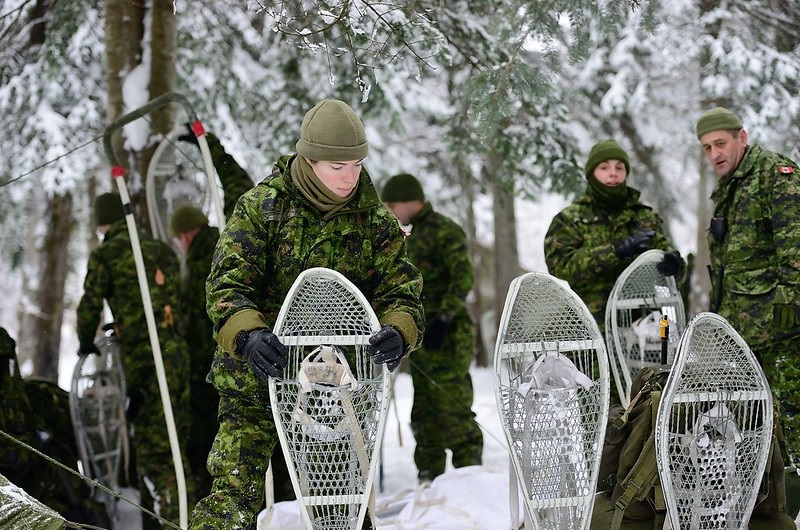Strengthening the Forces: Taking it outdoors – cold weather physical performance, nutrition and hydration
December 9, 2024 – Defence Stories
Estimated read time – 3:00

Caption
Reservists from 35 Canadian Service Battalion (35 Cdn Svc Bn) participate in a winter warfare exercise in Valcartier, Quebec on January 24, 2015.
When working outside or enjoying the great Canadian outdoors, fueling your body adequately for cold weather is important. Whether you’re walking the dog, shoveling snow, sledding, or skiing, cold-weather activities require energy and hydration. Here’s how to fuel your body for performance in cold weather.
Cold weather and higher altitudes increase energy demands. Just breathing in cold air requires more energy as your body warms and humidifies the air before it reaches your lungs. Shivering takes up energy too. Staying hydrated and eating well before, during, and after exercise will help you stay energized, avoid fatigue, and make the most of your winter adventures.
Carbohydrates are your body’s main energy source during exercise. There are two types: complex and simple. Complex carbohydrates, found in whole grains, cereals, pasta, and legumes, digest slowly and provide a steady energy supply. Simple carbohydrates, found in fruits, milk, and sugary foods like candy and sports drinks, give a quick but short-lived energy boost.
For light activities like tobogganing or snowshoeing, your regular healthy meals will be enough to keep you fueled. If you’re engaging in high-intensity or longer-duration activities, or exercising at higher altitudes, you’ll need to eat more frequently, focusing on both complex and simple carbs. Start with a breakfast that includes carbohydrates, like whole grains. Bring some carbohydrate-rich snacks to keep your energy up throughout the day.
Dehydration might not seem like a big issue in cold weather, but it’s still important to stay hydrated. Breathing cold, dry air causes water loss, especially at higher altitudes. Wearing heavy winter gear can make you sweat more than you realize. While your thirst may decrease in the cold, you still need to drink regularly to avoid dehydration. A simple way to check your hydration is by looking at the colour of your urine – aim for a pale yellow, like lemonade.
Here are some tips for staying hydrated and energized in cold weather:
- Keep snacks (e.g.: bars or gels) warm by packing them close to your body or with a heat pack.
- Warm soups in a thermos can provide both fluids and energy if you’re out for a while.
- Use an insulated thermos to carry warm water or other warm drinks to prevent their freezing.
- Carry water bottles upside down to keep the dispenser from freezing.
- Trail mix with dried fruit, nuts, and cereal provides carbs, fats, and protein.
- Wraps are easier to eat with gloves on than sandwiches.
While outdoors in the cold for fun or for work, remember to hydrate even when you’re not thirsty and eat healthy snacks to keep the fun and performance going!
Resources
- The best snacks to bring along in winter
- Fueling for Energy, Performance and Recovery (PDF, 14.3 MB)
Pamela Hatton, CD, RD, MSc; Veronic Clair, MD, MSc, CCFP, FRCP(c), PhD
Pam Hatton is part of the Strengthening the Forces team and works on promoting healthy eating and nutritional wellness. Dr. Veronic Clair is the Section Head for Strengthening the Forces.
Strengthening the Forces is the CAF/DND’s health promotion program providing expert information, guidance, training, tools, and leadership support to improve CAF members’ health and well-being.